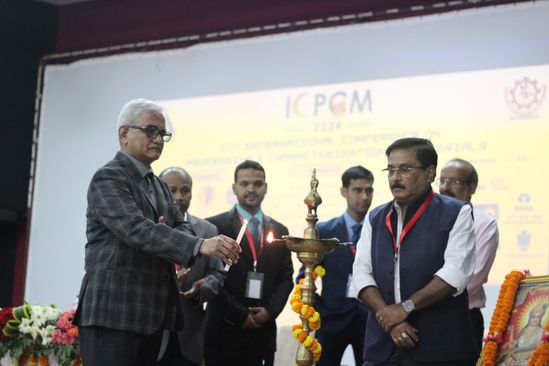Originally launched as a National Conference on Processing & Characterization of Materials (NCPCM) in 2011, the event expanded to an international level, becoming ICPCM in 2018. Since its inception ICPCM has established itself as a premier annual event, drawing renowned scholars, researchers, and industry leaders from across the globe.
The 2024 edition was inaugurated in the presence of the Chief Guest, Atanu Bhowmick, Director-in-Charge of Rourkela Steel Plant, alongside Prof. K. Umamaheshwar Rao, Director of NIT Rourkela and Chief Patron of the conference. Other dignitaries on the dais included the ICPCM 2024 organising team; Prof. Bankim Chandra Ray (Chief Advisor), Prof. Debasis Chaira (Head of the MM Department and Patron), Prof. Rajesh Kumar Prusty (Chairperson) Prof. Anshuman Patra (Chairperson), and Prof. Ajit Behera (Secretary).
The conference commenced today with a welcome address by Prof. Rajesh Kumar Prusty, who outlined its thematic focus. "This year's conference will cover diverse and critical topics such as stainless and special steels, waste management, fiber-reinforced polymer (FRP) composites, materials for renewable energy and energy storage, smart materials, recycling and reuse of materials, biomaterials, and materials design," he stated.
Chief Guest Bhowmick highlighted the significance of sustainable practices in the metallurgical and materials industries. He said, "As the second-largest producer of iron and steel globally, India faces the dual challenge of sustaining production while mitigating environmental impacts. Conferences like ICPCM play a crucial role in advancing innovative, low-emission industrial solutions that align with India’s long-term low-carbon development strategy." He emphasized the importance of eco-friendly industrial practices, particularly in recycling and waste management, as exemplified by the initiatives at Rourkela Steel Plant.
Prof. K. Umamaheshwar Rao emphasized the urgency of addressing environmental challenges in the materials industry and said "India has set an ambitious target to achieve net-zero carbon emissions by 2070. However, significant hurdles remain, particularly with the continued reliance on coal for industrial production. Even with disruptive technologies like electric vehicles, the materials required to manufacture these products still depend on energy, which is again sourced from fossil fuels. This highlights the immediate need for a shift toward sustainable practices like the production of ‘Green Steel’.
Prof. Anshuman Patra highlighted the scale and scope of the event. This year’s conference has attracted over 100 participants from across India and features keynote addresses from eminent faculty of globally renowned institutions, including the University of California, Berkeley; University of Leeds; University of Birmingham; University of Bristol; and North Carolina State University. Representatives from premier Indian institutions such as IISc Bangalore, IITs, and NITs, as well as leading industry professionals such as Tata Steel, and Jindal Stainless, will also contribute to the discussions.
Prof. Bankim Chandra Ray expressed gratitude to the event's sponsors, especially Rourkela Steel Plant and Tata Steel, for their generous support. He has emphasised that the emerging structural material is FRP composites. Head of the Department, Prof. Debasis Chaira highlighted the conference's role in collaborations between academia and industry, while Prof. Ajit Behera extended the vote of thanks, acknowledging the contributions of all participants and stakeholders.
ICPCM 2024 is driving interdisciplinary research in Materials Engineering, focusing on innovative solutions to global challenges. This field, which involves designing and improving materials like metals, semiconductors, alloys, polymers, etc., plays a crucial role in advancing industries such as production, construction, manufacturing, electronics, energy, aerospace, automotive and many more. With this collaboration between academia and industry, the conference aims to address critical needs and pave the way for sustainable and high-performance material innovations.
Read More Education News















